Hanoi – Thursday May 11, 2006 – Yesterday, Cathay Pacific’s regular flight from Hong Kong delivered a special group of passengers to Vietnam’s Noi Bai International Airport. Arriving in the cargo hold of the plane were 34 critically endangered Vietnamese pond turtles, Mauremys annamensis, being returned to their native homeland.
The turtles, which included two adults rescued from Hong Kong markets and 32 offspring born in captivity, were returned by the Kadoorie Farm and Botanic Garden, a private Hong Kong-based foundation that cares for rescued wildlife and works in close cooperation with the Hong Kong Agriculture Fisheries Conservation Department (AFCD).
Vietnam is home to 25 native species of tortoises and freshwater turtles, earning the country recognition as one of the region’s most biologically diverse hotspots for chelonians. Amongst this impressive diversity of species is the Vietnamese pond turtle (Mauremys annamensis), an endemic species native to lowland ponds and marshes in central Vietnam, and found no where else in the world. Last recorded in the wild in 1939, the Vietnamese pond turtle has since become rare as a result of unsustainable hunting and trade to meet the demand of export markets, as well as loss of its lowland habitat, mostly to agricultural development.
“The international trade of turtles has all but wiped out wild populations of many species throughout the country,” says Douglas Hendrie, a conservationists living in Vietnam and specializing in freshwater turtles. “Small populations of turtles may remain in some parks and protected areas,” says Hendrie. “But even these remaining turtles are under tremendous pressure from hunters and collectors, feeding the insatiable demand from markets in China.”
Vietnam’s new wildlife protection law for the first time specifically lists the Vietnamese pond turtle as a protected species that may not be bought, sold, traded, or consumed without a permit from the government. The Vietnamese pond turtle is also listed under Appendix II of the Convention on International Trade of Endangered Species (CITES) banning export of the species without a specific CITES permit from the national government.
But Hendrie says that he would like to see all of Vietnam’s freshwater turtles protected under the law except the Chinese soft-shell turtle, Pelodiscus sinensis . The IUCN Global Red List of Threatened Species lists more than half of Vietnam’s turtle species as “Critically Endangered” or “Endangered”, however only seven species are protected under Vietnamese law.
Hendrie also stressed the need for more stringent punishment for violators of Vietnam’s wildlife protection laws. “In most cases, the trade of wildlife in Vietnam is not treated as a serious crime, despite its lasting impact that hunting and trade has clearly had on Vietnam’s natural heritage.” “Traders rarely get more than a fine or a slap on the wrist for breaking the law”, Hendrie says. As a result, most conservationists agree that there are few disincentives to discourage people from engaging in the illegal wildlife business.
Wednesday’s returnees and their offspring were transferred to the Turtle Conservation Center (TCC) at Cuc Phuong National Park where the government runs a conservation program for critically endangered species, including the Vietnamese pond turtle. “Eventually, the turtles may be released in central Vietnam where they originated”, says Bui Dang Phong, manager of the TCC for Cuc Phuong National Park. Mr. Phong says he is elated to see the turtles finally make it back to Vietnam.
The Vietnamese pond turtles are undoubtedly ignorant of the journey they have made. From the marshes of Quang Nam Province to the markets of China, only to be plucked from a crate destined for sure demise, and eventually repatriated with their native land. Though their journey is not over, the lucky returnees and their 32 young that have never yet set foot in their native marshes of central Vietnam, are perhaps happy to be immersed in the cool waters of their new temporary home at the Cuc Phuong turtle center.
Surely they might be aware of some familiar smell that reminds them of home, and the presence of other turtles at the center, also victims of trade, and lucky as they are to have survived their own ordeal, and gain another chance to survive longer in life, as a turtle should.
Background
- 25 Species Native to Vietnam
There are 25 species of tortoises and freshwater turtles native to Vietnam. Five of these species are soft-shell turtles, and the remaining 20 are land tortoises or freshwater hard-shelled turtles.
- All of Vietnam’s Species are Threatened
All 25 of Vietnam’s tortoise and freshwater turtle species are listed on the IUCN Red List of threatened species. Sixteen of Vietnam’s turtle species are listed as Critically Endangered or Endangered on the Red List
- Struggle for Survival
Turtles are threatened by the combined impacts of hunting for the wildlife trade and loss of habitat. Most hard-shell turtles in the trade are presently exported from Vietnam to China where they are consumed as food and used in traditional Chinese medicine. Some estimates suggest that as much as 10 million turtles are traded annually within Asia, most of these ending up in China.
- Where have all the turtles gone?
In China, turtles are consumed as food and used to make traditional medicine. Turtles are also sold as pets, many of the most endangered species ending up in North America, Europe, and Japan.
- Legal Protection
Seven species are specifically protected under Vietnam’s principal wildlife protection law, Decree 32 (2006). Twenty-three species are listed under Appendix II and Appendix III of the Convention on the Trade of Endangered Species (CITES), regulating trade across international borders. Seventeen are listed under Appendix II and six of these are listed on Appendix III.
- A Profitable Enterprise
There is a growing commercial market for soft-shell turtles in Vietnam, consumed mainly in restaurants throughout the country. Farming of the Chinese soft-shell turtle (Pelodiscus sinensis) has become a successful enterprise in Vietnam.
- An Unprofitable Enterprise
In contrast with the Chinese soft-shell turtle, hard-shell turtles are not easily farmed for commercial purposes. This is principally due to their ecology. Most hard-shell turtles require many years to mature and lay few eggs each season. It may take ten or more years to raise a newly born turtle to a size suitable for selling. The investment in food and care during this period exceeds the market price for most species making farming operations unprofitable.
- Laundering of Wildlife
There are no clear examples of turtle “farming” operations in Vietnam for hard-shell turtle species. Most “farms” claiming to breed and raise hard-shell turtles are laundering turtles illegally collected from the wild.
Thank you:
The return was made coordinated and carried out by the Kadoorie Farm and Botanic Garden of Hong Kong and Cuc Phuong National Park with the support of the National Forest Protection Department of Vietnam. Logistics and technical support in Vietnam provided by the Asian Turtle Program (ATP) and the Humane Society International.
Image library:
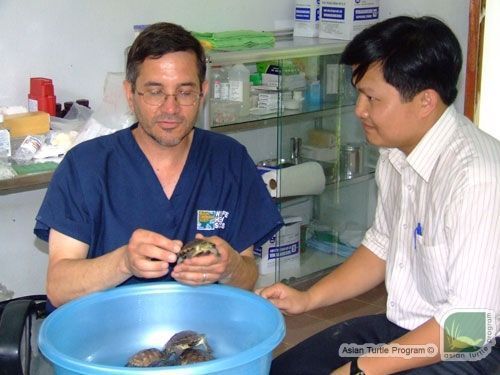
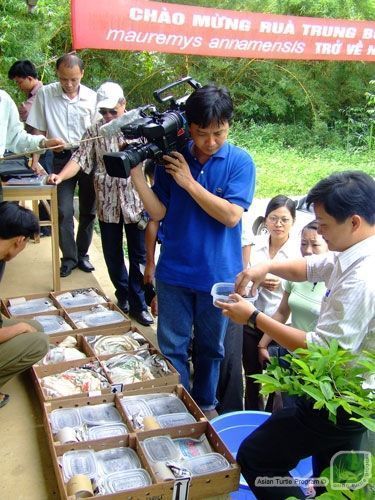
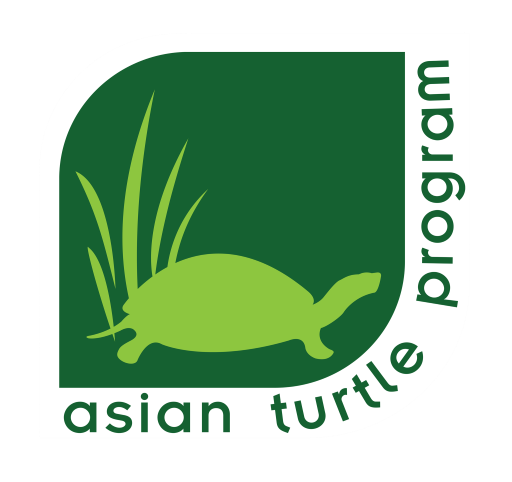
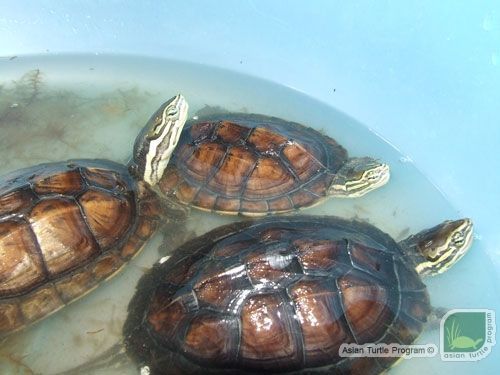
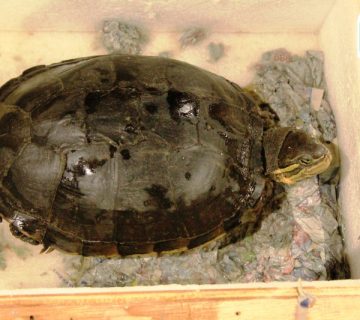
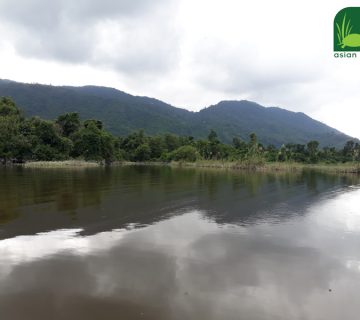
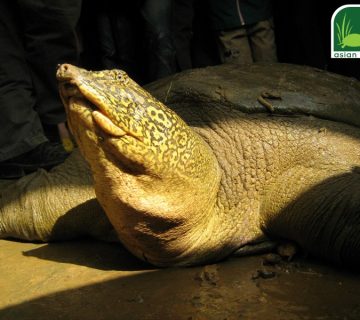
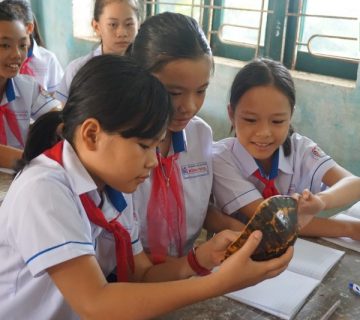
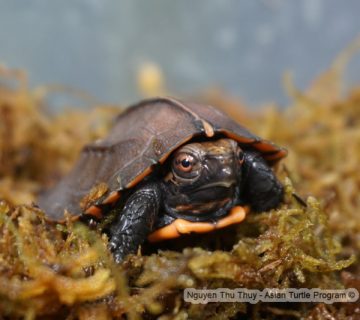
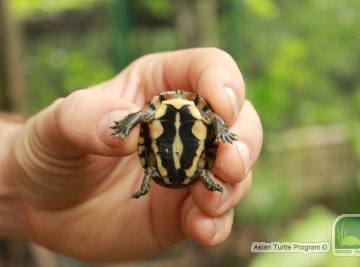
No comment